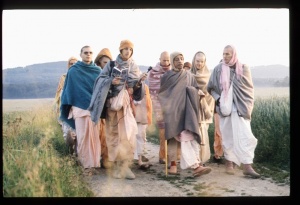SB 6.6.33-36

A.C. Bhaktivedanta Swami Prabhupada
TEXTS 33-36
- vaiśvānara-sutā yāś ca
- catasraś cāru-darśanāḥ
- upadānavī hayaśirā
- pulomā kālakā tathā
- upadānavīṁ hiraṇyākṣaḥ
- kratur hayaśirāṁ nṛpa
- pulomāṁ kālakāṁ ca dve
- vaiśvānara-sute tu kaḥ
- upayeme 'tha bhagavān
- kaśyapo brahma-coditaḥ
- paulomāḥ kālakeyāś ca
- dānavā yuddha-śālinaḥ
- tayoḥ ṣaṣṭi-sahasrāṇi
- yajña-ghnāṁs te pituḥ pitā
- jaghāna svar-gato rājann
- eka indra-priyaṅkaraḥ
SYNONYMS
vaiśvānara-sutāḥ — the daughters of Vaiśvānara; yāḥ — who; ca — and; catasraḥ — four; cāru-darśanāḥ — very, very beautiful; upadānavī — Upadānavī; hayaśirā — Hayaśirā; pulomā — Pulomā; kālakā — Kālakā; tathā — as well; upadānavīm — Upadānavī; hiraṇyākṣaḥ — the demon Hiraṇyākṣa; kratuḥ — Kratu; hayaśirām — Hayaśirā; nṛpa — O King; pulomām kālakām ca — Pulomā and Kālakā; dve — the two; vaiśvānara-sute — daughters of Vaiśvānara; tu — but; kaḥ — the prajāpati; upayeme — married; atha — then; bhagavān — the most powerful; kaśyapaḥ — Kaśyapa Muni; brahma-coditaḥ — requested by Lord Brahmā; paulomāḥ kālakeyāḥ ca — the Paulomas and Kālakeyas; dānavāḥ — demons; yuddha-śālinaḥ — very fond of fighting; tayoḥ — of them; ṣaṣṭi-sahasrāṇi — sixty thousand; yajña-ghnān — who were disturbing sacrifices; te — your; pituḥ — of the father; pitā — the father; jaghāna — killed; svaḥ-gataḥ — in the heavenly planets; rājan — O King; ekaḥ — alone; indra-priyam-karaḥ — to please King Indra.
TRANSLATION
Vaiśvānara, the son of Danu, had four beautiful daughters, named Upadānavī, Hayaśirā, Pulomā and Kālakā. Hiraṇyākṣa married Upadānavī, and Kratu married Hayaśirā. Thereafter, at the request of Lord Brahmā, Prajāpati Kaśyapa married Pulomā and Kālakā, the other two daughters of Vaiśvānara. From the wombs of these two wives of Kaśyapa came sixty thousand sons, headed by Nivātakavaca, who are known as the Paulomas and the Kālakeyas. They were physically very strong and expert in fighting, and their aim was to disturb the sacrifices performed by the great sages. My dear King, when your grandfather Arjuna went to the heavenly planets, he alone killed all these demons, and thus King Indra became extremely affectionate toward him.